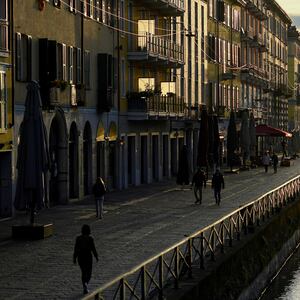ROME—On a balmy Friday afternoon at Rome’s Olympic stadium, 16,000 loosely masked fans lined up under an ancient obelisk that still has Mussolini’s name inscribed on it. They held smartphones showing their tickets to the UEFA European Football Championship, still named Euro 2020 as a sort of macabre memorial to last year’s tournament, which was lost to the pandemic.
Fans also held proof they were vaccinated, had recovered from coronavirus, or were COVID-free—or at least they were when they tested 48 hours earlier. They passed through thermal scanners, despite the ease with which a dose of Tylenol can easily trick the system. They were advised against giving high-fives or hugs if their team—Italy or Turkey—scored or won. And they felt like they were on top of the world.
To host such an event in a country where the pandemic’s epicenter was first to land—and where almost half of the population has yet to have their first anti-COVID vaccine—may seem crazy. But in Italy, soccer is a religion, and those who gathered at the stadium and Fan Zones spread across the city were ready to worship.
ADVERTISEMENT
“Finally we are back to normal,” a middle-aged man wearing a rather snug Italy Azzurri national team jersey that had seen better days said as he waited, socially distanced, behind a man with the Turkish flag wrapped around his shoulders. The Azzurri fan said he got vaccinated just to be able to attend. “The pandemic is over. It’s time to live again.”
The event, which will be held in 11 cities from June 11 to July 12, is a trial run for some countries like Italy and London, where stadiums will only be filled to 25 percent capacity. Others, like Budapest, are playing to a full house. Just two days before the kickoff, Spain’s captain tested positive for COVID-19. A few days before that, the Dutch goalkeeper also dropped out due to a positive test. Before that, several members of the Czech team withdrew. UEFA has, for the first time in its history, allowed nations to expand their teams to 26 players to make up for what will surely be more cases.
In many of the host cities, foreign fans will have to quarantine for two weeks before attending any in-person matches based on national restrictions. But in Italy, which requires people from Turkey to quarantine, several fan-packed flights from Istanbul were reported to have arrived as late as Thursday night. It seems unlikely they came all this way to watch from their hotel rooms.
What’s most remarkable about the fact that this event is happening in tandem with the pandemic is the collective amnesia of how this whole thing started in the first place. Headlines back in March 2020 pointed to a packed soccer match between Liverpool and Madrid as the spark that ignited a COVID tinderbox after 3,000 fans fled Spain when it was locking down due to a spike in cases. Thousands of cases across Europe were traced back to that match.
To be fair, no one knew what was on the horizon back then. And now, with mandatory masks, social distancing, and contact tracing, UEFA is certain fans are taking few risks.
Some countries, like the Netherlands, have banned certain fans altogether. British people aren’t allowed in for any reason due to a rise in variants in the U.K. In Baku, only fans from Turkey, Switzerland, and the UK will be granted a visa if they have a ticket. The other countries have a plethora of restrictions, and then of course fans returning home will face whatever rules their home countries have in place.
Health experts agree that such vigilance will surely keep people safe in the stadium. But it’s outside the venues where the risk is high. In Rome’s primary Fan Zone in Piazza del Popolo, a DJ set entertained the masses waiting to watch the match on a giant screen. Never mind that dance venues are still prohibited from opening—there was plenty of dancing going on. And there no COVID test or vaccine was required. Dr. Sakthi Karunanithi, England’s public health director, described fan zones as potential “super spreader events” in most of the cities, threatening to erase progress Europe has made to calm the latest wave of the pandemic.
But for football fans, no deterrent is enough to miss the beautiful game.







